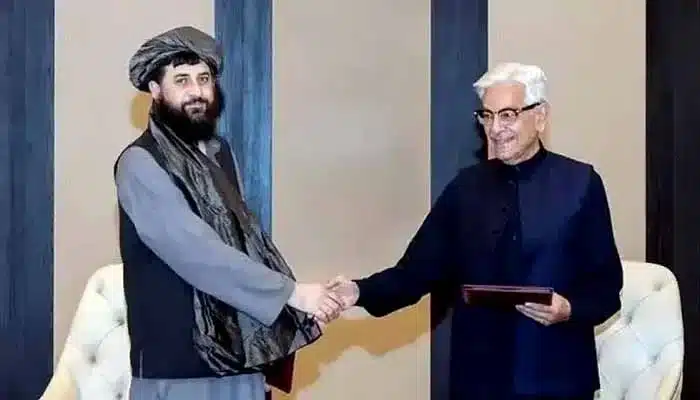Pakistani delegation extends stay in Istanbul: sources
Islamabad presses for “verifiable” action against terrorists.
Asif says India waging “low-intensity war” against Pakistan.
ISLAMABAD: Pakistan has agreed to resume talks with the Afghan Taliban regime in Istanbul at the request of mediator Turkiye, after earlier rounds between Islamabad and Kabul failed to “bring about any workable solution,” sources said on Thursday.
Sources familiar with the development told Geo News that Pakistan decided to resume the dialogue process to give peace another chance. The Pakistani delegation, which had been preparing to return home following the breakdown of earlier talks, will now extend its stay in Istanbul to continue discussions.
The negotiations will reportedly focus on Pakistan’s core demand that Afghanistan take “clear, verifiable and effective action” against terrorist groups operating from its soil, sources added.
Despite mediation efforts by friendly nations, talks between Pakistan and Afghanistan in Istanbul had collapsed after the Taliban regime refused to provide verifiable guarantees that their territory would not be used by groups such as the TTP to launch attacks against Pakistan.
Islamabad has repeatedly conveyed its concerns to Taliban rulers over cross-border attacks and urged that Afghan territory not be used for terrorism against Pakistan.
Minister for Information and Broadcasting Attaullah Tarar had confirmed early Wednesday morning that the four-day talks in Istanbul with the Afghan Taliban had ended without a breakthrough, despite Pakistan repeatedly presenting evidence-backed counterterrorism demands.
“The dialogue thus failed to bring about any workable solution,” Tarar had said in an X post. He further said Pakistan had long sought cooperation from Kabul against militants targeting the country.
He had also thanked Qatar, Turkiye, and other friendly nations “for their support and sincere efforts to bring about a peaceful solution to the problem of terrorism.”
Meanwhile, Defence Minister Khawaja Muhammad Asif, in an interview with Geo News, said that the ongoing negotiations with the Taliban government in Istanbul had yet to produce a breakthrough. He warned that the progress so far did not justify heightened expectations.
Asif said that Qatar and Turkey had acted as mediators, with the Qatari defence minister and the head of Turkish intelligence working to ensure the talks succeeded and to prevent any disruption.
“Our delegation had reached the airport last night to return, but Qatar and Turkey asked us to give the talks another chance. Efforts were underway to engage the Kabul delegation and explore a viable path forward,” he added.
The defence minister emphasised that progress would depend on Kabul changing its stance under the guidance of these friendly nations. “If they stopped supporting terrorists, it would be a crucial step,” he noted.
Asif stressed that peace was the foundation for any results. “Without it, no forward movement would be possible. If India-backed terrorism or TTP support continued, nothing could be achieved,” he warned.
“If Kabul wanted to play a positive role, we welcome it. But if they remained obstinate or acted as India’s proxy, nothing could be done. Any attempts to destabilise Pakistan’s peace would be met decisively,” Asif concluded.
Deep strike warning to Taliban
A day earlier, Asif warned that Pakistan would indeed conduct airstrikes deep inside Afghanistan if terrorists use its soil against Pakistan.
In a post on X, Asif said Pakistan engaged in talks at the request of brotherly countries in an effort to give peace a chance, but “venomous statements” by certain Afghan officials clearly reflect the devious and splintered mindset of the Taliban regime.
“We have borne your treachery and mockery for too long, but no more. Any terrorist attack or any suicide bombing inside Pakistan shall give you the bitter taste of such misadventures. Be assured and test our resolve and capabilities, if you wish so, at your own peril and doom,” the defence czar posted on X.
Asif added: “Let me assure them that Pakistan does not require to employ even a fraction of its full arsenal to completely obliterate the Taliban regime and push them back to the caves for hiding. If they wish so, the repeat of the scenes of their rout at Tora Bora with their tails between the legs would surely be a spectacle to watch for the people of the region.”
The defence minister further accused the Taliban regime of blindly pushing Afghanistan into yet another conflict, just to retain its usurped rule and maintain the war economy that sustains them.
Meanwhile, in an interview with Al Arabiya English’s webtv show “Counterpoints”, Asif had said that New Delhi was waging a “low-intensity war” against Islamabad from Afghan soil.
Islamabad-Kabul tensions
Pakistan has been grappling with rising terror incidents, particularly in KP and Balochistan, since the Afghan Taliban regime took power in 2021.
The government has repeatedly urged the Taliban regime to rein in terrorist groups responsible for countless attacks in Pakistan.
However, the Taliban regime largely remained indifferent to Pakistan’s demands and provided refuge to multiple terrorist groups targeting security forces and civilians.
Instead of addressing Pakistan’s concerns about cross-border terrorism, the Taliban regime resorted to unprovoked firing along the border on October 12.
Pakistan Armed Forces retaliated swiftly, killing over 200 Taliban fighters and affiliated militants; however, as many as 23 Pakistani soldiers were martyred during the border clashes.
Security forces also conducted strikes inside Afghanistan, including in Kabul, destroying terrorists’ hideouts in the country.
Hostilities between forces of the two nations ceased after Pakistan accepted the Taliban regime’s request for a temporary ceasefire on October 17.
Delegations from the two countries later met for talks mediated by Qatar in Doha, where they agreed on a ceasefire agreement.
Turkiye then hosted the second round of talks in Istanbul, which began on October 25.
However, the talks ended inconclusively after four days over what Pakistani authorities described as the Taliban delegation’s “illogical” arguments, which they said were “detached from ground realities”.

